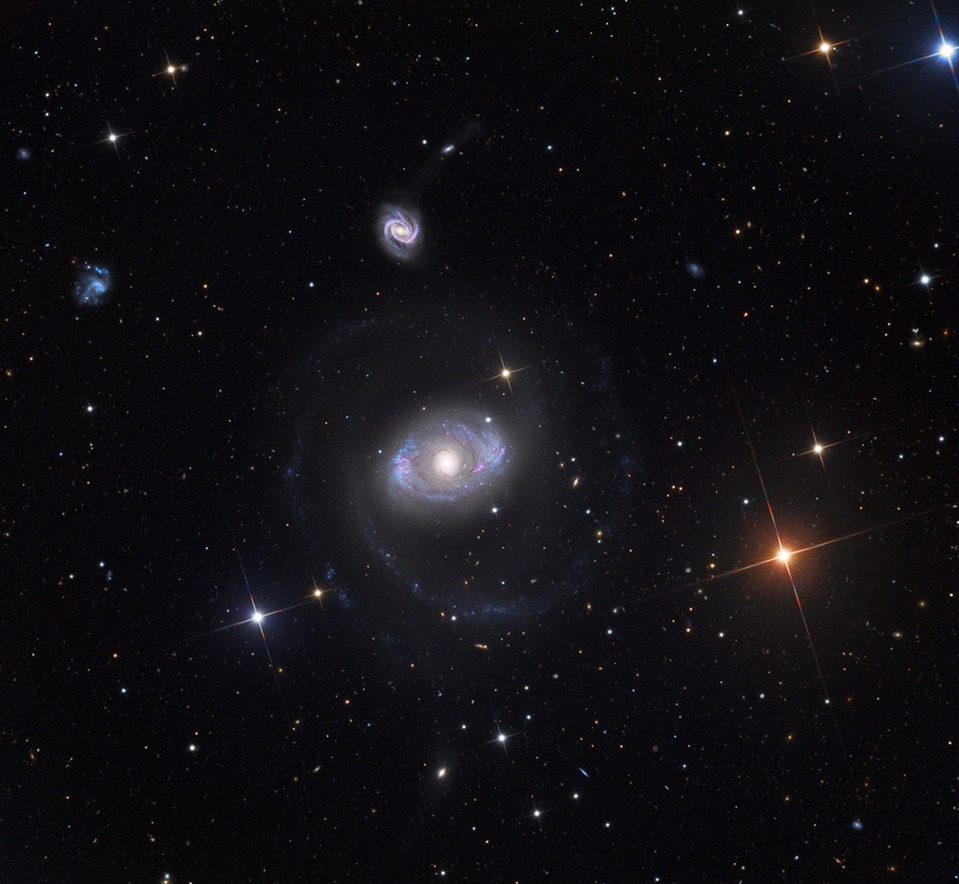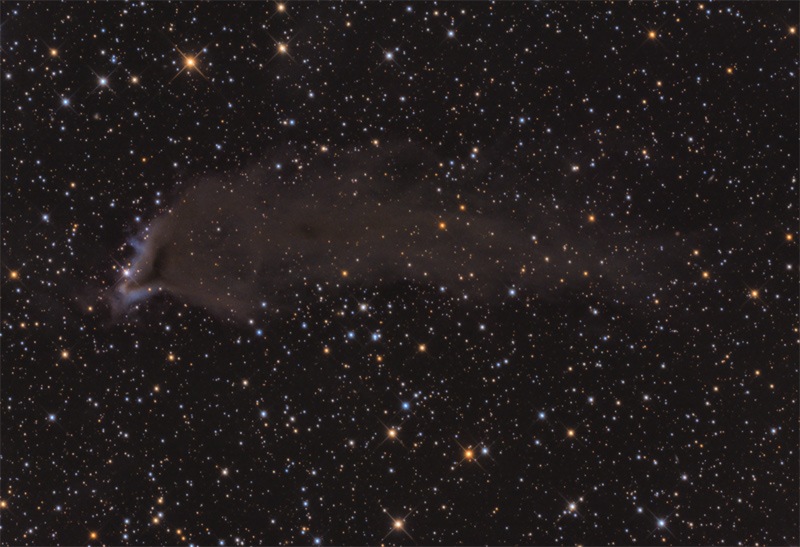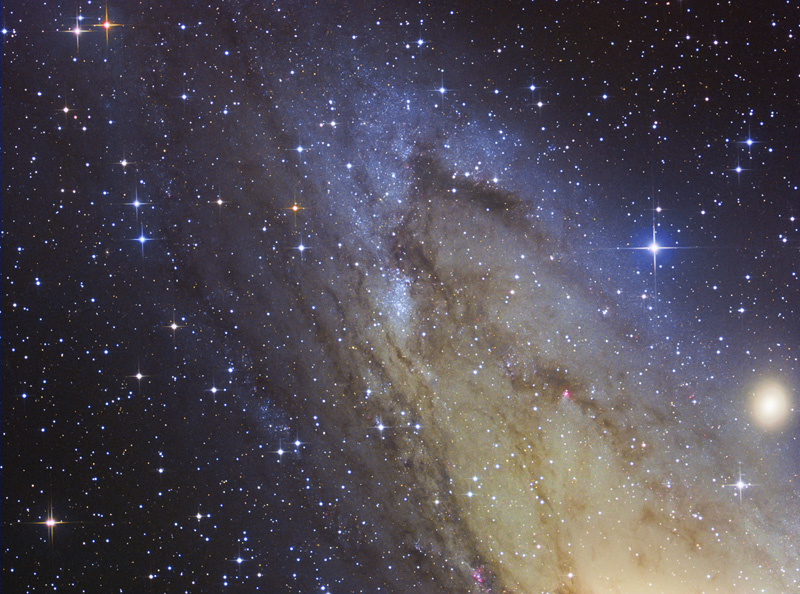Found images: 2016 May
Found images: 2016 May
Have you seen a great image or video somewhere that you think would make a great APOD? Nominate it for APOD! Please post as much information here as you have about the image/video with a link to any source(s) for it you know of here, and the editors will take a look.
When posting the image itself, please do not post anything larger than a thumbnail here; please honor the copyright holder's copyright.
Please keep hotlinked images under 400K.
Thank you!
A closed mouth gathers no foot.
-
starsurfer
- Stellar Cartographer
- Posts: 5409
- Joined: Thu Mar 15, 2012 7:25 pm
-
starsurfer
- Stellar Cartographer
- Posts: 5409
- Joined: Thu Mar 15, 2012 7:25 pm
Re: Found images: 2016 May
Butterfly Nebula (IC 1318)
http://www.straightontillmorning.me/Ast ... wnVLsxM/X3
Copyright: Hytham Abu-Safieh
http://www.straightontillmorning.me/Ast ... wnVLsxM/X3
Copyright: Hytham Abu-Safieh
HEIC: Hubble Spies NGC 4394
Hubble Spies NGC 4394
ESA Hubble Picture of the Week | 2016 May 02
Credit: ESA/Hubble, NASA
ESA Hubble Picture of the Week | 2016 May 02
Credit: ESA/Hubble, NASA
[img3="Credit: NASA/ESA/HubbleDiscovered in 1784 by the German–British astronomer William Herschel, NGC 4394 is a barred spiral galaxy situated about 55 million light-years from Earth. The galaxy lies in the constellation of Coma Berenices (Berenice's Hair), and is considered to be a member of the Virgo Cluster.
Acknowledgement: Judy Schmidt (geckzilla)"]http://cdn.spacetelescope.org/archives/ ... w1618a.jpg[/img3][hr][/hr]
NGC 4394 is the archetypal barred spiral galaxy, with bright spiral arms emerging from the ends of a bar that cuts through the galaxy’s central bulge. These arms are peppered with young blue stars, dark filaments of cosmic dust, and bright, fuzzy regions of active star formation. At the centre of NGC 4394 lies a region of ionised gas known as a LINER. LINERs are active regions that display a characteristic set of emission lines in their spectra— mostly weakly ionised atoms of oxygen, nitrogen and sulphur.
Although LINER galaxies are relatively common, it’s still unclear where the energy comes from to ionise the gas. In most cases it is thought to be the influence of a black hole at the centre of the galaxy, but it could also be the result of a high level of star formation. In the case of NGC 4394, it is likely that gravitational interaction with a nearby neighbour has caused gas to flow into the galaxy’s central region, providing a new reservoir of material to fuel the black hole or to make new stars.
Know the quiet place within your heart and touch the rainbow of possibility; be
alive to the gentle breeze of communication, and please stop being such a jerk. — Garrison Keillor
alive to the gentle breeze of communication, and please stop being such a jerk. — Garrison Keillor
-
starsurfer
- Stellar Cartographer
- Posts: 5409
- Joined: Thu Mar 15, 2012 7:25 pm
Re: HEIC: Hubble Spies NGC 4394
Another spectacular galaxy image from Hubble, really shows the resolution that can be achieved and certainly justifies putting a telescope in space!bystander wrote:Hubble Spies NGC 4394
ESA Hubble Picture of the Week | 2016 May 02
Credit: ESA/Hubble, NASA[img3="Credit: NASA/ESA/HubbleDiscovered in 1784 by the German–British astronomer William Herschel, NGC 4394 is a barred spiral galaxy situated about 55 million light-years from Earth. The galaxy lies in the constellation of Coma Berenices (Berenice's Hair), and is considered to be a member of the Virgo Cluster.
Acknowledgement: Judy Schmidt (geckzilla)"]http://cdn.spacetelescope.org/archives/ ... w1618a.jpg[/img3][hr][/hr]
NGC 4394 is the archetypal barred spiral galaxy, with bright spiral arms emerging from the ends of a bar that cuts through the galaxy’s central bulge. These arms are peppered with young blue stars, dark filaments of cosmic dust, and bright, fuzzy regions of active star formation. At the centre of NGC 4394 lies a region of ionised gas known as a LINER. LINERs are active regions that display a characteristic set of emission lines in their spectra— mostly weakly ionised atoms of oxygen, nitrogen and sulphur.
Although LINER galaxies are relatively common, it’s still unclear where the energy comes from to ionise the gas. In most cases it is thought to be the influence of a black hole at the centre of the galaxy, but it could also be the result of a high level of star formation. In the case of NGC 4394, it is likely that gravitational interaction with a nearby neighbour has caused gas to flow into the galaxy’s central region, providing a new reservoir of material to fuel the black hole or to make new stars.
Also I thought the name was familiar, it is next to the shell elliptical galaxy M85, both can be seen in this image by Antonio Sánchez.
-
starsurfer
- Stellar Cartographer
- Posts: 5409
- Joined: Thu Mar 15, 2012 7:25 pm
Re: Found images: 2016 May
NGC 80 region
http://www.capella-observatory.com/Imag ... 65EtAl.htm
Copyright: Makis Palaiologou, Stefan Binnewies and Josef Pöpsel
http://www.capella-observatory.com/Imag ... 65EtAl.htm
Copyright: Makis Palaiologou, Stefan Binnewies and Josef Pöpsel
Re: HEIC: Hubble Spies NGC 4394
I, too, love that image.
The exquisite detail and the impressive symmetry make the galaxy look large, but in reality, it is smaller than the Milky Way.
There is little star formation in this galaxy, and there are few obvious nebulas.
Note the bar-end enhancements at 7 o'clock and 1 o'clock. At these positions are large patches of old to intermediate populations of stars, slightly bluer and therefore slightly younger than the stars in the bulge. Bars often grow that way, because new stars form and collect at the bar ends, as in NGC 1300.
Beautiful image!
Ann
The exquisite detail and the impressive symmetry make the galaxy look large, but in reality, it is smaller than the Milky Way.
There is little star formation in this galaxy, and there are few obvious nebulas.
Note the bar-end enhancements at 7 o'clock and 1 o'clock. At these positions are large patches of old to intermediate populations of stars, slightly bluer and therefore slightly younger than the stars in the bulge. Bars often grow that way, because new stars form and collect at the bar ends, as in NGC 1300.
Beautiful image!
Ann
Color Commentator
-
starsurfer
- Stellar Cartographer
- Posts: 5409
- Joined: Thu Mar 15, 2012 7:25 pm
Re: Found images: 2016 May
Southern Crab Nebula (Hen 2-104)
http://www.chart32.de/index.php/component/k2/item/152
Copyright: CHART32
Processing: Johannes Schedler
http://www.chart32.de/index.php/component/k2/item/152
Copyright: CHART32
Processing: Johannes Schedler
-
starsurfer
- Stellar Cartographer
- Posts: 5409
- Joined: Thu Mar 15, 2012 7:25 pm
-
starsurfer
- Stellar Cartographer
- Posts: 5409
- Joined: Thu Mar 15, 2012 7:25 pm
-
starsurfer
- Stellar Cartographer
- Posts: 5409
- Joined: Thu Mar 15, 2012 7:25 pm
Re: Found images: 2016 May
PuWe 1
http://www.noao.edu/image_gallery/html/im1279.html
Copyright: T.A. Rector (University of Alaska Anchorage) and H. Schweiker (WIYN and NOAO/AURA/NSF)
http://www.noao.edu/image_gallery/html/im1279.html
Copyright: T.A. Rector (University of Alaska Anchorage) and H. Schweiker (WIYN and NOAO/AURA/NSF)
-
starsurfer
- Stellar Cartographer
- Posts: 5409
- Joined: Thu Mar 15, 2012 7:25 pm
Re: Found images: 2016 May
NGC 4151
http://www.caelumobservatory.com/gallery/n4151.shtml
Copyright: Adam Block
Adam Block has posted another brilliant galaxy image. NGC 4151 is a Seyfert galaxy with an active core.
Note the fantastic background galaxies!
Ann
http://www.caelumobservatory.com/gallery/n4151.shtml
Copyright: Adam Block
Adam Block has posted another brilliant galaxy image. NGC 4151 is a Seyfert galaxy with an active core.
Note the fantastic background galaxies!
Ann
Color Commentator
- geckzilla
- Ocular Digitator
- Posts: 9180
- Joined: Wed Sep 12, 2007 12:42 pm
- Location: Modesto, CA
- Contact:
Re: Found images: 2016 May
A cloud type I know Bob likes posting from time to time. Includes an amusing story.
This video was taken with an iPhone 6 by Dr. Alan Walters from the University Hospital window in Augusta, GA. Walters, an anesthesiologist at the hospital, said he taped his phone to the window while he put an epidural In a patient. "I guess I was finally in the right place at the right time," Walters said.
Click to play embedded YouTube video.
Just call me "geck" because "zilla" is like a last name.
-
starsurfer
- Stellar Cartographer
- Posts: 5409
- Joined: Thu Mar 15, 2012 7:25 pm
Re: Found images: 2016 May
I saw this yesterday and was amazed by the spatial resolution afforded by a 32 inch telescope! Note the extensive tidal features, these are also visible in other images such as this one by Antonio Sánchez.Ann wrote:NGC 4151
http://www.caelumobservatory.com/gallery/n4151.shtml
Copyright: Adam Block
Adam Block has posted another brilliant galaxy image. NGC 4151 is a Seyfert galaxy with an active core.
Note the fantastic background galaxies!
Ann
-
starsurfer
- Stellar Cartographer
- Posts: 5409
- Joined: Thu Mar 15, 2012 7:25 pm
Re: Found images: 2016 May
ESO: A Cosmic Hit and Run (Vela Ring Galaxy)
A Cosmic Hit and Run (Vela Ring Galaxy)
ESO Picture of the Week | 2016 May 09
ESO Picture of the Week | 2016 May 09
[img3="Credit: ESO. Acknowledgement: Jean-Christophe Lambry"]https://cdn.eso.org/images/screen/potw1619a.jpg[/img3][hr][/hr]This Picture of the Week shows the Vela ring galaxy, visible as a bright core surrounded by a baby blue halo. As the name suggests, this ring galaxy — located in the southern constellation of Vela (The Sails) — is notable due to its compact core and large circular belt of gas and stars.
It is thought that ring galaxies like this are created when larger galaxies are punctured by a smaller galactic aggressor, which, passing through the heart of its more sizeable victim, triggers a shock wave that spreads outwards. This pushes gas to the galaxy’s periphery, where it begins to collapse and form new stars. The Vela ring galaxy is unusual in that it actually exhibits at least two rings, suggesting that the collision was not a recent one.
This picture also features a galaxy known as ESO 316-33, seen just above and to the left of the Vela ring galaxy, and a bright star known as HD 88170.
Know the quiet place within your heart and touch the rainbow of possibility; be
alive to the gentle breeze of communication, and please stop being such a jerk. — Garrison Keillor
alive to the gentle breeze of communication, and please stop being such a jerk. — Garrison Keillor
HEIC: A Spiral Snowflake (NGC 6814)
A Spiral Snowflake (NGC 6814)
ESA Hubble Picture of the Week | 2016 May 09
ESA Hubble Picture of the Week | 2016 May 09
[img3="Credit: ESA/Hubble & NASASpiral galaxies together with irregular galaxies make up approximately 60% of the galaxies in the local Universe. However, despite their prevalence, each spiral galaxy is unique — like snowflakes, no two are alike. This is demonstrated by the striking face-on spiral galaxy NGC 6814, whose luminous nucleus and spectacular sweeping arms, rippled with an intricate pattern of dark dust, are captured in this NASA/ESA Hubble Space Telescope image.
Acknowledgement: Judy Schmidt (geckzilla)"]http://cdn.spacetelescope.org/archives/ ... w1619a.jpg[/img3][hr][/hr]
NGC 6814 has an extremely bright nucleus, a telltale sign that the galaxy is a Seyfert galaxy. These galaxies have very active centres that can emit strong bursts of radiation. The luminous heart of NGC 6814 is a highly variable source of X-ray radiation, causing scientists to suspect that it hosts a supermassive black hole with a mass about 18 million times that of the Sun.
As NGC 6814 is a very active galaxy, many regions of ionised gas are studded along its spiral arms. In these large clouds of gas, a burst of star formation has recently taken place, forging the brilliant blue stars that are visible scattered throughout the galaxy.
Know the quiet place within your heart and touch the rainbow of possibility; be
alive to the gentle breeze of communication, and please stop being such a jerk. — Garrison Keillor
alive to the gentle breeze of communication, and please stop being such a jerk. — Garrison Keillor
- Fred the Cat
- Theoretic Apothekitty
- Posts: 975
- Joined: Mon Feb 22, 2016 4:09 pm
- AKA: Ron
- Location: Eagle, Idaho
Re: Found images: 2016 May
[img3="Credit: ESA/Hubble & NASA
Acknowledgement: Judy Schmidt (geckzilla)"]http://cdn.spacetelescope.org/archives/ ... w1619a.jpg[/img3][hr][/hr]
Nice pick Geck! Talk about spiral symmetry. They could call this one – the Fibonacci galaxy. It looks in perfect ratio. Acknowledgement: Judy Schmidt (geckzilla)"]http://cdn.spacetelescope.org/archives/ ... w1619a.jpg[/img3][hr][/hr]
Freddy's Felicity "Only ascertain as a cat box survivor"
-
starsurfer
- Stellar Cartographer
- Posts: 5409
- Joined: Thu Mar 15, 2012 7:25 pm
Re: ESO: A Cosmic Hit and Run (Vela Ring Galaxy)
Despite its name, this galaxy is actually within the boundaries of the constellation Antlia.bystander wrote:A Cosmic Hit and Run (Vela Ring Galaxy)
ESO Picture of the Week | 2016 May 09[img3="Credit: ESO. Acknowledgement: Jean-Christophe Lambry"]https://cdn.eso.org/images/screen/potw1619a.jpg[/img3][hr][/hr]This Picture of the Week shows the Vela ring galaxy, visible as a bright core surrounded by a baby blue halo. As the name suggests, this ring galaxy — located in the southern constellation of Vela (The Sails) — is notable due to its compact core and large circular belt of gas and stars.
It is thought that ring galaxies like this are created when larger galaxies are punctured by a smaller galactic aggressor, which, passing through the heart of its more sizeable victim, triggers a shock wave that spreads outwards. This pushes gas to the galaxy’s periphery, where it begins to collapse and form new stars. The Vela ring galaxy is unusual in that it actually exhibits at least two rings, suggesting that the collision was not a recent one.
This picture also features a galaxy known as ESO 316-33, seen just above and to the left of the Vela ring galaxy, and a bright star known as HD 88170.
-
starsurfer
- Stellar Cartographer
- Posts: 5409
- Joined: Thu Mar 15, 2012 7:25 pm
Re: HEIC: A Spiral Snowflake (NGC 6814)
I was just going to post this picture myself!bystander wrote:A Spiral Snowflake (NGC 6814)
ESA Hubble Picture of the Week | 2016 May 09[img3="Credit: ESA/Hubble & NASASpiral galaxies together with irregular galaxies make up approximately 60% of the galaxies in the local Universe. However, despite their prevalence, each spiral galaxy is unique — like snowflakes, no two are alike. This is demonstrated by the striking face-on spiral galaxy NGC 6814, whose luminous nucleus and spectacular sweeping arms, rippled with an intricate pattern of dark dust, are captured in this NASA/ESA Hubble Space Telescope image.
Acknowledgement: Judy Schmidt (geckzilla)"]http://cdn.spacetelescope.org/archives/ ... w1619a.jpg[/img3][hr][/hr]
NGC 6814 has an extremely bright nucleus, a telltale sign that the galaxy is a Seyfert galaxy. These galaxies have very active centres that can emit strong bursts of radiation. The luminous heart of NGC 6814 is a highly variable source of X-ray radiation, causing scientists to suspect that it hosts a supermassive black hole with a mass about 18 million times that of the Sun.
As NGC 6814 is a very active galaxy, many regions of ionised gas are studded along its spiral arms. In these large clouds of gas, a burst of star formation has recently taken place, forging the brilliant blue stars that are visible scattered throughout the galaxy.
NGC 6814 is a truly lovely-looking galaxy, particularly in an image like this, where so many details are visible. Compared with the latest Hubble galaxy before this one, NGC 4394, the spiral arms of NGC 6814 look so much more impressive. NGC 6814 really appears to be a much larger galaxy than NGC 4394, too.
NGC 6814 is nevertheless pretty red as spiral galaxies go, particularly in view of the fact that it is classified as an SBbc galaxy - a barred galaxy whose arms put it midway between classes Sb and Sc. For example, NGC 4725, which is classified as an SBb galaxy, whose bulge should be larger and whose arms should be less pronounced and less widely spread out than those of NGC 6814, is actually bluer in color than NGC 6814. But the latter galaxy is located in Aquila, not too far from the galactic plane, unlike NGC 4725, which is in Coma Berenices, near the galactic pole. NGC 6814 is probably (a lot) more reddened than NGC 4725 and intrinsically bluer, although it does seem to have a bright yellow bulge.
Fascinating, in any case, and it is a lovely image!
Ann
Color Commentator
-
starsurfer
- Stellar Cartographer
- Posts: 5409
- Joined: Thu Mar 15, 2012 7:25 pm
Re: Found images: 2016 May
-
starsurfer
- Stellar Cartographer
- Posts: 5409
- Joined: Thu Mar 15, 2012 7:25 pm
Re: Found images: 2016 May
NGC 1579
http://www.astro-koop.de/?attachment_id=1557
Copyright: Stefan Heutz, Wolfgang Ries and Michael Breite
http://www.astro-koop.de/?attachment_id=1557
Copyright: Stefan Heutz, Wolfgang Ries and Michael Breite
-
starsurfer
- Stellar Cartographer
- Posts: 5409
- Joined: Thu Mar 15, 2012 7:25 pm




